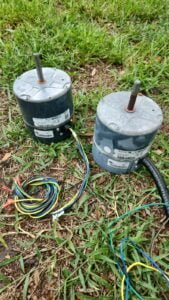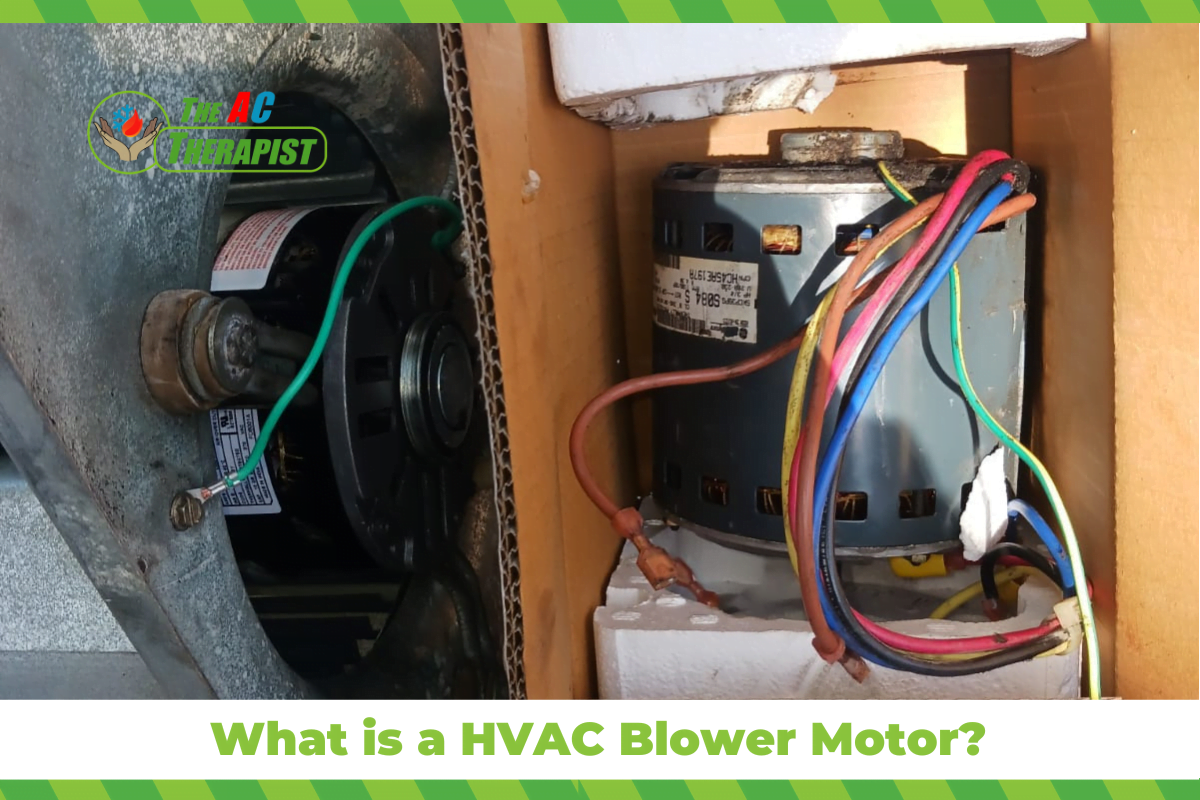What is a HVAC Blower Motor?
Maintaining a comfortable home or office environment is crucial for everyone. Your Heating, Ventilation, and Air Conditioning (HVAC) system plays a pivotal role in this by regulating temperature and air quality. One of the essential components of your HVAC system is the blower motor. If your HVAC blower motor starts to fail, your entire HVAC system can malfunction, affecting indoor comfort levels.
In this blog post, we will delve into the indicators of a bad HVAC blower motor and how you can diagnose it effectively.
Understanding the Role of the HVAC Blower Motor
The HVAC blower motor is a critical component of your heating, ventilation, and air conditioning system. It essentially serves as the heart of the HVAC system, similar to how the engine is vital to a car. Without the blower motor, your HVAC system would simply fail to function as intended.
The Function of the Blower Motor
The primary function of the blower motor is to control the amount of air circulated through the HVAC system. When you adjust your thermostat to a desired temperature, you’re instructing the blower motor on the speed at which it should operate.
The motor powers the fan located in the air handler, which then forces air through the ductwork installed throughout your home or building. The circulated air is either heated or cooled based on your thermostat settings.
In a heating scenario, the blower motor pushes air over a heat exchanger to warm it before directing it into the various rooms in your home. Conversely, for cooling, the blower motor drives air across the evaporator coil, where it is cooled and dehumidified before being circulated back into the rooms, the scenario would be the same with a heat pump.

The Types of Blower Motors
There are three main types of blower motors: single-speed, multi-speed, and variable-speed.
- Single-Speed Motors: These motors, as the name suggests, operate at one speed — full capacity. When the HVAC system is turned on, the motor operates at its maximum speed, regardless of the temperature settings.
- Multi-Speed Motors: These offer more flexibility than single-speed motors. They can operate at a few different pre-set speeds. This type of motor gives you more control over the airflow rate and the energy used by your HVAC system.
- Variable-Speed Motors: These are the most sophisticated and energy-efficient. They can operate across a wide range of speeds, adjusting to the precise airflow requirements of your HVAC system. Variable-speed motors provide excellent comfort levels because they can more precisely control both temperature and humidity levels in your home.
The Importance of the Blower Motor
The importance of the blower motor cannot be overstated. It directly impacts the performance of your HVAC system in terms of temperature regulation, energy efficiency, and air quality control.
A well-functioning blower motor helps maintain the desired temperature in your living or working space, ensuring optimal comfort. It’s also crucial for energy efficiency; a struggling or malfunctioning motor requires more energy to operate, leading to increased utility costs.
In addition, the blower motor also affects the air quality in your home. It’s responsible for circulating air through the system’s filters, which help remove dust, allergens, and other airborne contaminants. A malfunctioning blower motor could result in poorer air quality.
In summary, the blower motor’s role in an HVAC system is pivotal for maintaining a comfortable, healthy, and energy-efficient environment. Therefore, keeping it in good working condition should be a priority for every homeowner or building manager.
Now that we have established the crucial role of the HVAC blower motor, let’s explore the telltale signs that it might be failing.
1. Unusual Noises –
One of the most common indicators of a problem with the HVAC blower motor is the emergence of unusual sounds. A healthy HVAC system should operate relatively quietly. A bit of low humming noise is normal, especially when it’s working hard during extremely hot or cold days. However, if you begin to notice strange noises, such as squealing, rattling, or banging, it’s an indication that something may be wrong with the blower motor.
Squealing or screeching sounds could indicate a problem with the motor bearings or the blower belt. On the other hand, a rattling or banging noise could suggest a loose part within the motor. It’s advisable to have a professional check the system if you encounter any of these noises. Schedule online now or call (813) 343-2212

2. Poor Airflow or No Airflow
Another significant sign of a bad blower motor is poor airflow or no airflow at all from your vents. If the blower motor isn’t functioning correctly, it cannot push air efficiently through your HVAC system and into your space. You may notice uneven cooling or heating, or some rooms might feel stuffier than others.
You might also notice that your HVAC system is continually running but not achieving the desired temperature. This is often due to a weak blower motor that’s not pushing enough air through the system.
3. Overheating Blower Motor
An overheating blower motor is a clear sign of a problem. This issue often occurs due to a lack of lubrication, a failing capacitor, or debris and dirt accumulation within the HVAC system. You might smell a burning or hot smell coming from your HVAC system, which is often a sign of an overheating motor.
4. Increased Energy Bills
While increased energy bills can result from various factors, a failing blower motor might be the culprit. A struggling motor will draw more energy in an attempt to maintain its function, leading to higher energy consumption and thus, elevated utility bills.
If you observe a sudden spike in your energy bills and can’t attribute it to increased usage or higher energy prices, it would be wise to have your HVAC system, including the blower motor, checked by a professional.
5. Motor Does Not Start
Finally, a clear sign of a bad blower motor is if the motor doesn’t start at all. This could be due to various issues, including a blown motor, a bad capacitor, or problems with the electrical connections.
How much does it cost to replace a blower motor in an HVAC system?
The cost to replace a blower motor in an HVAC system can widely vary depending on several factors such as the type of motor, the specific model of your HVAC system, your location, and the rates of the HVAC professional you hire.
On average, homeowners might expect to pay anywhere from $650 to $1,000 for a new blower motor installation. This cost includes both the price of the new motor and the labor cost for a professional to install it. High-end models or complex installations could push the cost higher, potentially exceeding $1,000.
Variable-speed blower motors are typically more expensive than their single-speed or multi-speed counterparts. Moreover, if the blower motor replacement also requires significant modifications to the HVAC system or extensive labor, this will also increase the cost.
Keep in mind that while this may seem like a large expense, a new, efficient blower motor can help save on energy costs over time, improve the performance of your HVAC system, and enhance the overall comfort level in your home.
Lastly, remember that ignoring a faulty blower motor can lead to more severe HVAC issues down the line, potentially costing more in the long run. Therefore, it’s important to address HVAC issues promptly when they arise. For a fast, free and effective estimate get in contact with The AC Therapist.
Schedule online now or call (813) 343-2212

How long does an HVAC blower motor last?
The lifespan of an HVAC blower motor can vary widely, depending on several factors including its quality, how well it’s maintained, the overall maintenance of the HVAC system, and how often the system is used.
On average, a properly maintained blower motor should last between 10 to 20 years. However, this can vary. Lower quality or heavily used motors might fail closer to the 10-year mark, while higher quality models that are well maintained and used moderately can often exceed 20 years.
It’s important to remember that regular HVAC maintenance is crucial in extending the life of your blower motor. This includes cleaning and replacing filters regularly, ensuring the motor is properly lubricated (if applicable, as many modern motors are permanently lubricated), and having regular HVAC inspections conducted by a professional. These inspections can catch early signs of wear and tear, allowing for repairs to be done before they turn into more significant problems.
Signs that your blower motor may be nearing the end of its life include reduced airflow from vents, unusual noises from the HVAC system, and a constantly running blower.
Lastly, it’s worth mentioning that although a blower motor can technically be replaced to extend the life of an HVAC system, if your system and the motor are approaching 15 to 20 years of age, it may be more cost-effective to consider replacing the entire system. Newer models are typically more energy-efficient and may provide better heating and cooling performance, ultimately saving you money in the long run.
As always, an HVAC professional can provide the best advice based on your specific circumstances, the age and condition of your HVAC system, and the local climate.
Can a blower motor be replaced by the homeowner or does it need a professional?
Replacing an HVAC blower motor is a complex task and generally requires the expertise of a professional HVAC technician. Here are a few reasons why:
- Technical Knowledge: Replacing a blower motor isn’t a simple plug-and-play job. It requires understanding the HVAC system’s overall functioning, knowledge of the correct motor specifications for your particular system, and the ability to correctly wire the new motor. Incorrect installation can damage the new motor and potentially other parts of the HVAC system.
- Tools and Equipment: Replacing a blower motor requires specific tools and equipment that most homeowners don’t typically have on hand. This could include multi-meters, capacitors, and specialized HVAC tools.
- Safety: Working with HVAC systems involves dealing with electricity, which can pose significant safety risks if not handled properly. Professionals are trained to handle such risks and know how to safely perform repairs and replacements.
- Efficiency and Warranty: A professional HVAC technician can ensure the new blower motor is installed efficiently and correctly, which can save you time and potential future repair costs. Additionally, many HVAC parts come with a manufacturer’s warranty that may only be valid if the part is installed by a certified professional.
While some homeowners with substantial HVAC knowledge and experience might feel comfortable replacing a blower motor, in most cases, it’s advisable to hire a professional. This not only ensures the job is done correctly but also maintains the safety and integrity of your HVAC system.
How to maintain an HVAC blower motor?
Maintaining your HVAC blower motor can extend its lifespan, ensure optimal performance, and keep your HVAC system running efficiently. Here are some tips to maintain your HVAC blower motor:
1. Regularly Replace or Clean Air Filters: One of the simplest yet most effective maintenance tasks is to replace or clean the air filters in your HVAC system regularly. Dust and debris can clog the filter, causing the blower motor to work harder than necessary, which can lead to premature wear. As a general rule, filters should be checked every month and cleaned or replaced as needed, typically every 1-3 months.
2. Regular Professional Maintenance Checks: Having your HVAC system regularly serviced by a professional is crucial for the longevity of the blower motor. A professional can check the entire system for potential issues, clean essential components, check refrigerant levels, and ensure the system is working as efficiently as possible.
3. Regularly Clean Blower Components: Along with the filter, other components of the HVAC system, like the blower’s fan blades, can also accumulate dust and debris. These should be cleaned periodically to ensure efficient operation. This task is usually performed during a professional maintenance check.
4. Inspect the Blower Motor Regularly: Check the blower motor for any signs of damage or wear and tear. Listen for unusual noises and observe whether it’s functioning as expected. If you notice any irregularities, call a professional for further inspection.
5. Proper Lubrication: Some blower motors require regular lubrication to keep them running smoothly. If your blower motor has oil ports for lubrication, ensure they’re lubricated annually. However, many modern HVAC systems use motors that are permanently lubricated and sealed by the manufacturer and do not require additional lubrication.
6. Maintain the Entire HVAC System: The efficiency of your blower motor is linked to the health of your entire HVAC system. Ensuring the rest of your HVAC system is in good shape, such as the ductwork and thermostat, can help maintain the blower motor.
Finally, remember that when it comes to electrical components like a blower motor, if you’re not comfortable performing maintenance yourself, it’s always best to call in a professional. An expert HVAC technician has the training and expertise to safely and effectively maintain your HVAC system. Regular maintenance can prevent small issues from turning into major problems, saving you time, discomfort, and potentially costly repairs down the line.

Should I replace the blower motor with the original or a universal one?
Choosing between an original equipment manufacturer (OEM) blower motor and a universal blower motor largely depends on various factors such as availability, cost, the specific requirements of your HVAC system, and personal preference. Both have their own sets of advantages and potential drawbacks.
Original (OEM) Blower Motor:
OEM blower motors are made by the same manufacturer as your HVAC system. This means they are designed to perfectly fit and function within your specific system. Replacing with an OEM part ensures you’re getting a motor that’s built to the exact specifications of your HVAC system, which can result in more efficient and optimal performance. However, OEM parts can be more expensive and may take longer to obtain if they’re not readily available.
Universal Blower Motor:
Universal blower motors are designed to work in a wide variety of HVAC systems. They can be a good choice when the OEM part is hard to find or if you’re looking for a more cost-effective solution. Universal motors can be less expensive than OEM parts and are often more readily available. However, because they’re not designed for your specific HVAC system, they might not perform as efficiently or last as long. In addition, depending on the system, some modification may be required for it to fit correctly, which could potentially complicate the installation process.
In general, for the best performance and longevity, an OEM blower motor is usually recommended if it’s available and fits within your budget. However, a universal blower motor can be a viable option in certain circumstances. Regardless of which you choose, ensure the installation is performed by a qualified HVAC technician to guarantee the motor is installed correctly and safely.
Before making a decision, consider consulting with an HVAC professional. They can provide expert advice tailored to your specific situation and HVAC system.
Are HVAC blower motors covered under warranty?
Typically, HVAC blower motors are covered under the warranty of your HVAC system. However, the specifics of the warranty coverage can depend on several factors:
- Manufacturer’s Warranty: Most HVAC systems come with a manufacturer’s warranty that often covers key components such as the blower motor. The length and terms of the warranty can vary widely depending on the manufacturer and the specific model of your HVAC system.
- Type of Warranty: Some warranties may cover only the parts, while others may cover both parts and labor for a specified period. It’s also common for different parts of the system to have different warranty lengths. For example, the compressor might have a longer warranty than other components like the blower motor.
- Installation: Many warranties require that the HVAC system be installed by a licensed professional to ensure it’s done correctly. DIY or unprofessional installation could potentially void the warranty.
- Maintenance Requirements: Some warranties require regular maintenance by a professional to remain valid. Failure to maintain your system as outlined by the manufacturer could void your warranty.
- Transferability: If you’ve moved into a home with an existing HVAC system, the warranty may or may not be transferable to you as the new owner.
If you’re unsure whether your blower motor is covered under warranty, check your HVAC system’s warranty documentation or contact the manufacturer or your HVAC installer. If a repair or replacement is needed, having an understanding of your warranty can potentially save you significant costs.
Remember that while warranties can provide valuable protection against unexpected repair costs, they do not eliminate the need for regular maintenance. Keeping your HVAC system well-maintained can help prevent issues that might not be covered by your warranty and extend the life of your system.
Final Thoughts
If you notice any of these signs, it’s crucial to address the issue promptly. Delaying might lead to more serious damage to your HVAC system and disrupt the comfort of your home or office. While some basic maintenance tasks like cleaning and replacing filters can be done yourself, diagnosing and repairing a bad blower motor is often a job for a professional HVAC technician due to the complexity and potential hazards involved.
Remember, regular maintenance of your HVAC system can prevent many issues, including blower motor failure. Always ensure your system is inspected and serviced by a professional at least once a year to maintain its efficiency and prolong its lifespan.
Hopefully, this guide helps you identify potential issues with your HVAC blower motor before they escalate. Here’s to a comfortable and healthy indoor environment!









